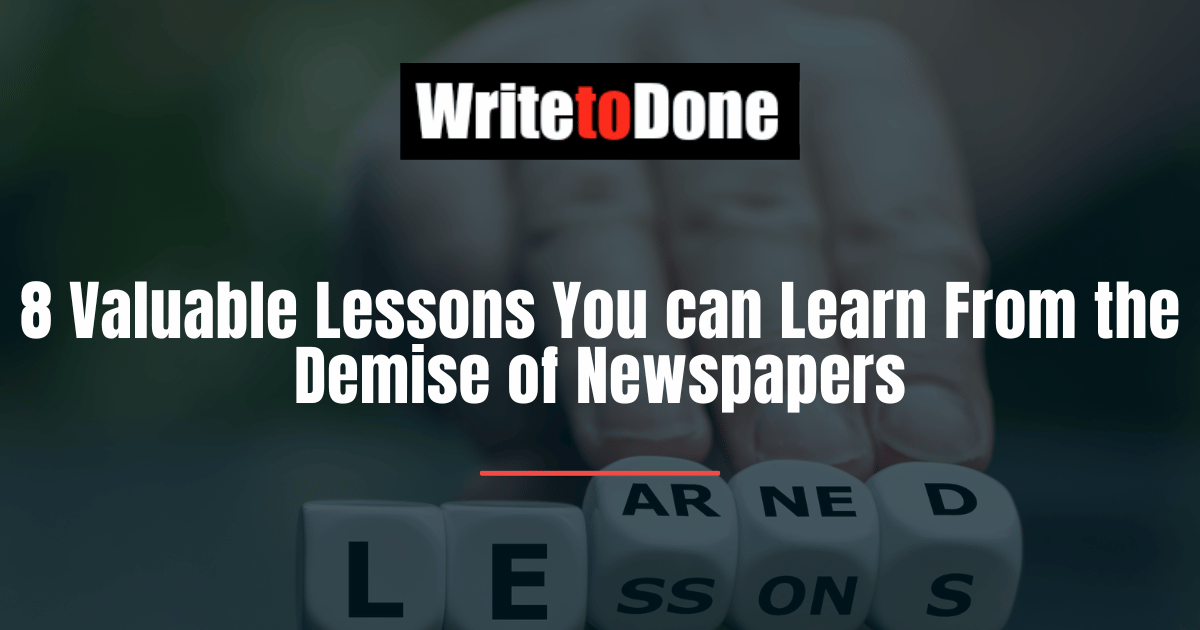It’s not news that the news industry is changing rapidly, and the traditional newspaper and magazine industry is in a whole mess of trouble.
Newspapers are losing readers at an alarming rate to online reading — and readers are reading not only newspapers, but blogs and many other types of sites.
Newspapers are trying to find a model for making money online, but they’re not learning fast enough, not adapting fast enough. Online ads can’t support them, because now the monopoly for publishing news and commentary has been broken, and advertising has been spread out among thousands and thousands of sites.
How can the newspaper industry adapt? Well, they’ll either have to figure that out quickly, or they’ll die.
As a former journalist and editor at a Gannett-owned newspaper, I have some thoughts — things I’ve learned from my career as a blogger at Zen Habits.
1. Smaller is better. Newspapers can’t survive on online ads not because it’s an impossible model for publishing — I do it at Zen Habits and many other blogs and smaller news sites do it. They can’t survive on online ads because they’re too huge. Not only do they have a newsroom of journalists and editors, but they have copy editors, layout editors, graphic artists, photographers, managing editors and more. And that’s just the newsroom — one small part of a newspaper company. There’s also advertising, production (the presses and so on), circulation (the delivery of newspapers), accounting, the IT department, human resources, and overall management (the publisher, president, vice president, staff, etc.).
There is no way an organization that huge can survive on online ads, especially now that the news monopoly has been broken. The solution isn’t to charge more, but to become smaller. If a newspaper transitions to an only online edition, it can get rid of its printing presses and printing sections. Smaller can mean they get rid of large parts of accounting and HR and management and so on. Basically, everyone should be involved in actually producing content, with perhaps a small amount of ad sales staff. Smaller is better — with a small news team, you can produce great content and live on much less. More on this below.
2. If you charge, people won’t come. Readers are used to reading things for free. Sure, they’ll pay a couple dollars for an entire issue of a newspaper, but who reads the entire newspaper online every day? Now we just read a couple articles that are interesting, and move on to other sites. If the other sites are free, why should we keep coming back if you start to charge us? Not only that, but the biggest sources of traffic and growth come not from regular readers but from links from other blogs and news sites, social media, email, and social networks such as Twitter and Facebook … and if you erect a pay wall, no one will be able to link to you! You’ll die a slow but inevitable death.
3. If you charge, others will offer it for free. The Wall Street Journal and a couple of other business news sites are getting away with charging because the business crowd doesn’t mind paying for access to up-to-the-minute business information. It’s just a regular expense, a part of doing business. However … that won’t work forever. Eventually other sites will come up that offer information that’s just as good, but free. These sites will be smaller, and at first won’t have as much credibility. But as people migrate to them — because they’re free, and the information is the same — they’ll start to build up some credibility, and then WSJ will be in real trouble. The same will be true for others who charge for access to information — people will eventually get it somewhere else, because that’s an opportunity for someone to create a business based on giving the information away for free. They’ll be ad supported, sure, but if they’re smaller they’ll be able to live on that.
4. You’ve got competition now. This is just an extension of No. 3 above, but expanded: in the old days, you only competed against other major news media. That’s no longer the case. Now, lots of people are publishing news — including everyday people who post news to Twitter, right when news is happening, as eye-witnesses. Now lots of people write commentary (granted: sometimes too many). Now there’s competition everywhere for people’s interest and attention. So you’re going to need to step it up — you can’t do things the old way. Figure out what your competitive advantages are (more on this below), and use them to your advantage. We still need you to be a government watchdog, we still need your in-depth reporting, but perhaps some of the things you’re doing that have been replaced by new competitors (such as Craigslist or weather services and the like) can be dropped.
5. Your main asset is credibility, not money or size. The difference between you and a blog isn’t the writing, or how fast you get the news, or how big you are, or even how deep your pockets are … but how much people trust you. This trust is huge, actually, because it means when others might break the news before you, people will still want you to confirm that it’s true. Whatever you do, don’t lose that trust. Use it to your advantage. Blogs are building that trust as we speak, and if you break the trust in any way, you’ll lose everything.
6. You’ve got the skills — but you need to adapt. One of my advantages when I started blogging was that I was a journalist by training, which isn’t required for blogging by any means — most of the best bloggers were never journalists and many journalists aren’t good bloggers. But I had some skills that translate well in the online world — writing fairly clear and concise articles, for example, and using bullet points and other devices to make it easier for readers to find the essential information, and headline writing, and research. You’ve got those skills and more — but they don’t translate exactly to blogging. You need to learn blogging, and the online world, and really participate in it and understand it, so that your skills can be adapted to the new demands of readers. Part of that is that you need to connect with them (see next item), and you also need to learn community and new forms of writing that are foreign to journalism. You’ll also need to forget division of labor — everyone needs to produce content, and everyone needs to be able to handle tech and business.
7. Connect with readers and bloggers, don’t snub them. Blogs have succeeded in part because we are a community, and a large discussion. Readers can connect with bloggers in ways they never connected with journalists — the best journalists have always been (and mostly still are) in ivory towers, looking down on the reading public and barely accessible but through letters to the editor (and more recently, email). But readers can instantly communicate with bloggers, and the best bloggers talk back, are part of the discussion. And bloggers connect with each other — we have giant conversations through our blogs and Twitter, link to each other, not just to our own articles. You need to become social, in the new sense of the word — not just in going to community functions and press conferences.
8. Become lean and distributed. Having a huge building full of employees and equipment is unsupportable these days. The best bloggers work from home, or from coffee shops. We have no huge building, because we couldn’t afford it. Let your reporters work from home or from the road, with a laptop, and you remove the need for an office. Learn to collaborate online, to do business online. Let readers become news gatherers, and give them a voice and a channel for putting out the news. Let the community be your sources, in a new and exciting way, and you’ll need fewer employees.
What does all this mean for the employees of newspapers? It means you’ll need to learn new ways of working, and that some of your will be laid off, inevitably — either because the newspaper purposely leans down, or because it will go out of business. For the sake of our society, I hope the best newspapers don’t go out of business, that they learn to be leaner. But many employees will be out of work — and that’s OK. You’ll start your own blogs and websites and go into competition with your former employer, as I have. And you’ll love every minute of it.
Image courtesy of Pixabay

















